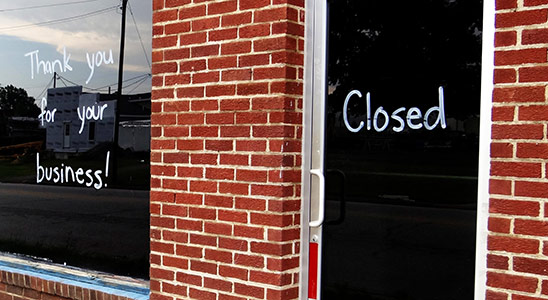Around a third of new businesses fail in the first two years, and half in the first five. But many businesses fail for the same reasons. In the independent retail sector, business failure could be prevented by recognising some of those potential pitfalls. So what do small business owners need to recognise in order to continue thriving for years to come? Here are five common pitfalls for small retail businesses.
Limited marketing.
While word-of-mouth marketing is great, businesses that rely on it tend to go broke faster than the small businesses that invest in other areas of marketing. You simply can’t bring in new customers if those customers don’t know that you exist. While small businesses don’t need a multi-million dollar marketing plan, some marketing is essential to survival. Low cost marketing, such as social media marketing, online ads, email newsletters, and advertisements with local news and radio outlets, can help keep the doors open — and customers coming in — for years to come.
A bad location — online and off.
While marketing is essential, some customers will find you simply by driving by your business — if you choose a good location, that is. Convenience is a big factor for brick-and-motar customers, and an out-of-the-way location negates that. Make sure customers can find you easily — and that they’ll come back often — by choosing an ideal location.
Similarly, your business should also be easy to find online. Creating an SEO-friendly website with a simple URL is an important part of building a successful business.
Not charging enough.
Yes, small businesses still have to compete with the big box stores — but many small businesses fail simply because they don’t charge enough to cover overhead costs and leave room for growth. Don’t make what should be a limited time sale a 24/7 deal, or you could end up closing your doors.
Struggling through the slow seasons.
Every business tends to have a slow season — but that’s not the time to put your feet up on your desk and relax. Don’t just sit and wait out the slow season. Build up your marketing tactics, plan a sale or event to get customers in the door, expand your social media marketing efforts. Work to build a more predictable cash flow, and your business is more likely to succeed.
Buying the wrong merchandise — or too much of it.
What you sell matters, but navigating what to sell and how much can be tough for new business owners. Be sure to look for a product that’s in demand with your particular customers. Understanding trends is your industry helps tremendously when choosing stock. Along the same lines, avoid investing too heavily in a new product before you know how well it will sell.
Small businesses are quick to blame big businesses for their struggles — but if that were the case, the rise of retailers like Amazon would have eliminated every small business. More often than not, it’s the choices that the business makes that determine whether or not the retail company succeeds. By understanding the potential pitfalls, small business owners can navigate their way to a long-running, successful business.
